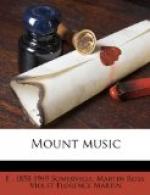“The point is,” he said, eagerly, “that when we are split up into two bands, we can do nothing much, but the lot of us together might—might make quite a difference.”
“Difference to what?” said Richard, ex-chief of the Elder Statesmen, unsympathetically. Like his father before him, he disliked change.
“Well, hold on!” said Larry, quickly, “wait just one minute, and I’ll tell you. I got the notion out of a book I found in the library. I don’t expect I’d have thought of it myself—” Larry’s transparent sky-blue eyes sought Richard’s appealingly. “It’s—it’s only poems, you know, but it’s most frightfully interesting—I brought it with me—”
“Oh—poems!” said Richard, without enthusiasm. “Are they long ones?”
“I don’t seem to care so awfully much about poetry,” abetted Judith, late Second-in-command.
John looked sapient, and said, neutrally, that some poetry wasn’t bad.
The Twins, who were engaged in a silent but bitter struggle for the corpse of a white rabbit, recently born dead, made no comment. Only Christian, her small hands clenched together into a brown knot, her eyes fastened on Larry’s flushed face, murmured:
“Go on, Larry!”
Larry went on.
“It’s called the Spirit of the Nation,” he said. “It’s full of splendid stuff about Ireland, and the beastly way England’s treated her. It sort of—sort of put the notion into my head that we might start some sort of a Fenian band, and that some day we might—well,” he turned very red, and ended with a rush, “we might be able to strike a blow for Ireland!”
“Moy oye!” said Richard, intensifying his favourite invocation in his surprise, “but what’s wrong with Ireland?”
The position wanted but the touch of opposition. Larry rather well bet Richard that there was plenty wrong with her! Penal laws! Persecution! Saxon despots grinding their heels into a down-trodden people! Revolution! Liberation! Larry had a tongue that was hung loosely in his head and was a quick servant to his brain.
“Of course I know we’re rather young—well, you’re nearly fourteen, Richard, and I’m thirteen and three months, that’s not so awfully young. Anyway, everything’s got to have a beginning—” He glowed upon his audience of six, his fair hair in a shock, his eyes and his cheeks in a blaze, and one, at least, of that audience caught fire.
The Revolutionary or Reformer, who hesitates at becoming a bore, is unworthy of his high office; and Larry, like most of his class, required but little encouragement. He produced a large book, old and shabby, the green and gold of its covers stained and faded, but still of impressive aspect.
“There are heaps of them, and they’re all jolly good. It’s rather hard to choose—” began the Revolutionary with a shade of nervousness. Then he again met Christian’s eyes, shining and compelling, and took heart from them.




